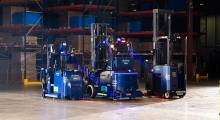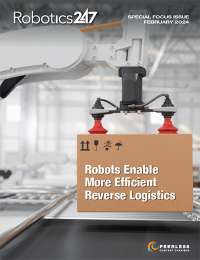Robots and other automation are critical in meeting the logistics and supply chain challenges that businesses face today today, according to presenters at the Reuters Supply Chain Execution 2022 Conference in Chicago this week.
“We’ve come a long way since we started making the investments [in automation],” said Sally Miller, CIO for North America at DHL Supply Chain.
Perhaps most notable of these investments was in picking robots from Locus Robotics Corp. The partnership started with a single robot five years ago, and now, DHL is using 2,000 LocusBots in various locations. Earlier this year, the mobile robots made their 100 millionth automated pick at DHL.
In addition to picking robots, DHL has invested in autonomous forklifts, parcel sorters, automated pallet loaders, and other automation throughout its facilities. “We’re all in on innovation,” Miller said.
Automation addresses labor shortage
“The robots really help with the labor shortage,” said Miller. She pointed out that there are 11 million unfilled jobs in the U.S., 6.5% of them in the logistics industry.
Some 80% of warehouse jobs have been handled manually, but that is quickly changing as DHL and other supply chain and logistics companies respond to the combination of the continuing growth of e-commerce and the ongoing worker shortage.
Among other issues, many of the warehouses are in remote locations that are somewhat removed from the largest population centers. Other warehouses are older and can only handle so many workers, even if they were available.
“The labor shortage continues to be a significant challenge for us, as are wage rates,” Miller said. “The 'Great Resignation' is still with us. We continue to adjust. People are looking for more quality of life today – they don’t necessarily want to work four 10-hour shifts.”
There aren’t enough people to meet the growing e-commerce demand, added Jasmine Lombardi, chief customer officer at Locus. “Robots provide solutions for when there is a huge spike in volume,” she said. “The ability to for people to work harder and longer simply isn’t sustainable.”
Users seek collaborators, not replacements
Though there was some concern at the outset from employees and others alike that the automation would displace jobs, Miller again emphasized the labor shortage in the logistics industry. She noted that the workers themselves have embraced the robots and other technology because they make their work much easier.
Collaborative mobile robots and other automation eliminate much of the repetitive work and heavy lifting, so logistics workers are more satisfied with their jobs, according to Miller. “We’ve lowered our turnover rate,” she added.
Lombardi noted that warehouses tend to use robots to eliminate miles of walking for employees.
“Robots relieve people from mind-numbing [repetitive] and other work where they just wear out,” said Barry Greenhouse. He is senior vice president and president of global supply chain and customer experience at industrial supply company W.W. Grainger.
During the COVID-19 pandemic, companies had to bridge the practical and theoretical to re-engineer how their networks worked as demand spiked, Greenhouse said. People are still needed in warehouses and elsewhere in logistics, not only for their critical thinking skills, but also for some tasks requiring the dexterity that robots have yet to achieve, he said.
Locus grows rapidly to meet demand
Lombardi said that Locus doesn’t just focus on selling robots or providing robots as a service (RaaS) to customers. Rather, it provides customers with solutions, she claimed. Such a strategy has enabled the company to grow tremendously over the last five years.
Inc. Magazine ranked Locus Robotics at No. 428 on its 2021 list of the 5,000 fastest-growing private companies in the U.S.
Another reason for the company’s growth, according to Lombardi, is that Locus empowers employees in the field and in the office to service customers, rather than forcing customers to wait on several levels of sign-offs.
Robots and reskilling
Lombardi said that supply chain automation also enables workers to shift within the industry or within the organization if they have the necessary skills, regardless of background. “We have lots of different jobs for people,” she said.
Locus has shifted engineers trained in other disciplines to be robotics engineers, she said. For example, the company’s current hiring specialist has a background in biology.
The company has worked to simplify the technologies used on the job, enabling many to use iPads rather than more complex technologies requiring additional training. That’s not to say that ongoing training isn’t an important element in the company’s working environment. Miller and Greenhouse noted that ongoing training is an essential element of their business environments as well.
“Many of our people have moved in and out of different functional areas,” Greenhouse said at the Reuters Supply Chain Execution Conference.
“We’re investing in our talent. Everyone needs to look forward, not back,” Miller said. “We have a lot of career advancement opportunities.”
But to answer the needs of the business and to push employees along, sometimes a company simply needs to put them into challenging positions and encourage them to perform, Miller said.
Lombardi recommended that logistics and supply chain companies collaborate with local technical institutions to find the talent and specialties that they need.
“I am excited about what is ahead for all of us,” she concluded.
About the Author
Follow Robotics 24/7 on Linkedin
Article topics
Email Sign Up


















